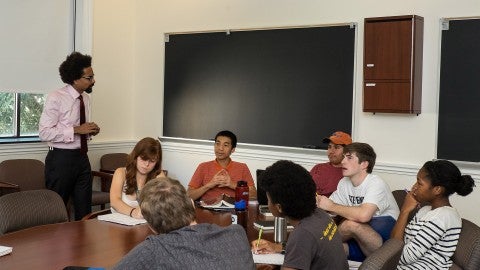Our graduate program is characterized by small classes, student-mentor advising, and a close-knit community of graduate students. We prepare graduates for careers as teachers, editors, public historians, and researchers—both within and outside the academy.
The graduate program in recent years has focused its recruitment and admission in four areas of overlapping strength, as well as offering study in other topical, geographical, and theoretical areas, including World History.
Recently the Department has hired specialists in the history of modern science and technology, and we are now open to applications in those specialties.
Approximately six new students enter the program each year; some have master’s degrees, but many enter directly from their undergraduate study. A student’s first two years are devoted to course work. Comprehensive exams in three chosen fields of study take place in the third year, before students begin work on a dissertation project.
Our Mentored Teaching Program allows doctoral students the chance to work closely with a professor in the department to learn how to organize and teach a university-level history class. Students can also develop additional professional skills by serving as an editorial assistant with a major peer-reviewed academic publication, the Journal of Southern History, which is hosted in the department. Our department is home to the database SlaveVoyages.org, an essential digital resource for studying the Atlantic slave trade, and graduate students can take part in that project as well.
A unique opportunity for qualified students to earn a dual degree from one of our international partners, Universidade Estadual de Campinas in Brazil or Instituto Mora in Mexico is also available.
Requirements for the Ph.D.
- Satisfactory completion of 36 credit hours, including HIST 575 Introduction to Doctoral Studies and seven additional graduate seminars.
- Satisfactory completion of HIST 578 Dissertation Prospectus Seminar
- 54 credit hours in dissertation research and writing (total 90 credit hours for the degree).
- Successful completion of a translation exam in a language other than the student’s native language and related to their envisioned dissertation research.
- Satisfactory performance on a written and oral comprehensive exam in three fields.
- Satisfactory completion of a dissertation presenting the results of original research.
Financial Support
All students entering the Rice PhD program in History receive:
- a fellowship paid over 12 months ($32K in 2023-24), guaranteed for five years by maintaining good academic standing in the program
- a full tuition waiver for five years and reduced tuition (currently $1,500/semester) beyond five years, if necessary
- a generous health insurance subsidy
- funding support for conference travel and archival research
There are a variety of opportunities for competitive sixth-year funding and tuition waivers, based on teaching and research interests.

